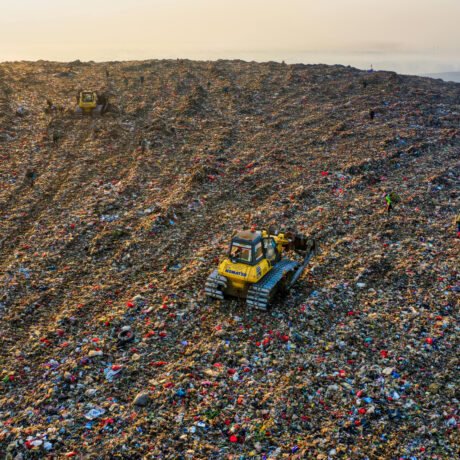Can fast fashion break its plastics habit?
Many of us are taking steps to reduce our plastic use. But what about our clothes? How much do we really know about the plastics in our wardrobes? Josie Warden, Head of Regenerative Design at the RSA unpacks some recent research that’s shining a light on the challenge.
Polyester, nylon, elastane, acrylic…these are just some of the synthetic fabrics you might have seen listed in your clothing labels. We aren’t used to thinking about these as plastics, but like plastic packaging, these too are derived from fossil fuels.
Synthetic fabrics create significant impacts on people and the environment throughout their lifetime:
At extraction, they are more energy-intensive than other fibres (in 2015, polyester produced for clothing emitted 282 billion kg of CO 2 – nearly three times more than for cotton.)
With every wash, they release hundreds of thousands of plastic microfibres environment – a 6kg wash could produce up to 700,000 fibres. Recent studies have found these have reached even the most remote parts of the arctic and are increasingly turning up in the food we eat.
And once created, plastics are difficult to manage – only a tiny proportion of synthetic fibres are recycled, with most being landfilled or incinerated.
View this post on Instagram
So, how much plastic is in our clothing?
Synthetics have boomed in popularity in recent decades. Their use in fashion doubled between 2000 and 2020, and polyester has overtaken cotton as the world’s most used fibre.
So, we know there are a lot of synthetics out there, but information about where these fibres end up on the high street is harder to find.
We recently analysed 10,000 items of clothing from across some of the UK’s leading online fast fashion brands – Asos, Boohoo, Missguided and PrettyLittleThing – to shed some light on how plastics are being used. This is what we found:
Fast fashion is awash with new plastics
We found that as many as 88% of recently listed items contained new plastics and, in the case of Boohoo, 60 percent of recently listed items were made exclusively from virgin plastics.
What about recycled fabrics? Well, recycled fabrics are being used but on a very small scale. Across the four brands we surveyed an average of only 3% of clothing contained recycled materials. For every garment produced that contains recycled plastics, scores are produced from entirely new petrochemicals.
We don’t realise how much plastic is in our clothing
There is an ‘awareness gap’ when it comes to how much plastic goes into our clothing. Just 49 percent of those who regularly buy fast fashion admit to buying clothing that contains synthetic materials. But with an average of 4 in 5 garments containing new plastics, the reality must be much higher. We believe that many people simply do not know where the fibres in their clothes come from. But we do want to see a change. Overall, three quarters of us want to see fewer plastics and petrochemicals used in the production of clothing, a clear message to the industry.
View this post on Instagram
Brands have a long way to go to meet their sustainability ambitions
These brands acknowledge that there is a problem, but they face huge challenges in transforming their supply chains if their ambitions are to go beyond greenwashing. Boohoo, for example, has set itself a target of using 100 percent recycled or ‘more sustainable’ polyester by 2025. With that date looming, it has a mountain to climb.
A change of clothes?
What can be done to address this challenge? Ultimately, we need to see brands makes changes to their business models. A primary allure of synthetics for fast fashion brands is their low price, allowing brands to large volumes at rock bottom prices.
Simply replacing synthetics with natural fibres isn’t a solution if it means creating more of them, because all fibres create impacts, including natural ones (cotton uses a lot of water for example). Instead, we need to see a reduction in the volume of clothing that is produced, a switch to producing good quality garments which are designed to be repaired, and a move towards more reuse and repair of existing garments.
View this post on Instagram
Policymakers, brands and citizens all have a role to play
Policymakers can help discourage poor practice and incentivise better approaches. We are asking the government to explore a per-item ‘plastics tax’ on clothing imported into or produced in the UK containing virgin plastics, to introduce the Extended Producer Responsibility commitments, which are currently being discussed in a Defra consultation. We’d also like them to explore routes for supporting businesses that take steps towards sustainable business models, such as reviewing VAT rates on repair services.
Fast fashion brands should explore new ways to promote second-hand clothing following the model of Depop and Asos’ ‘marketplace’, alongside different business models, such as rental and repair services. We would like to see brands publish statistics on how much plastic goes into their clothing, as part of greater transparency reporting about their social and environmental impacts and commitments.
Citizens can help make a change by thinking differently about their clothing and committing to buying less and buying better – shopping for more durable garments, making fewer impulse purchases as well as sharing, repairing and caring for their current clothing.
After all, the most sustainable garment is the thing you already own.
View this post on Instagram
Sources
RSA. (2021). Turning the Tide: Public attitudes on plastics and fast fashion.
RSA. (2021). Fast Fashion’s Plastic Problem
Changing Markets. (2021). Fossil Fashion
https://www.commonobjective.co/article/fibre-briefing-polyester
https://wrap.org.uk/resources/guide/getting-ready-extended-producer-responsibility
https://www.bbc.co.uk/news/business-57433221
Header image shared with permission from @jenandjennifer








